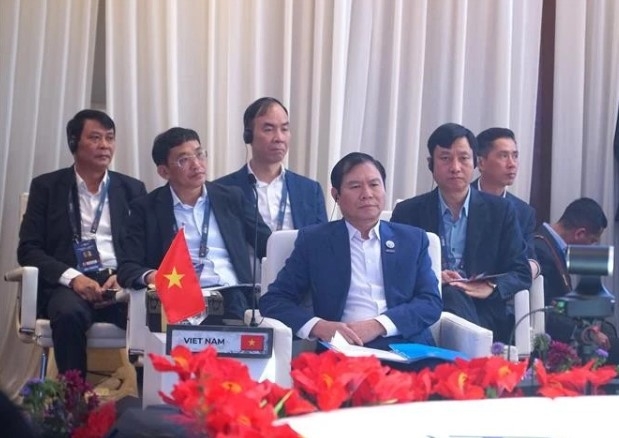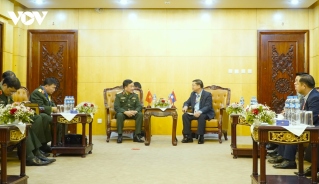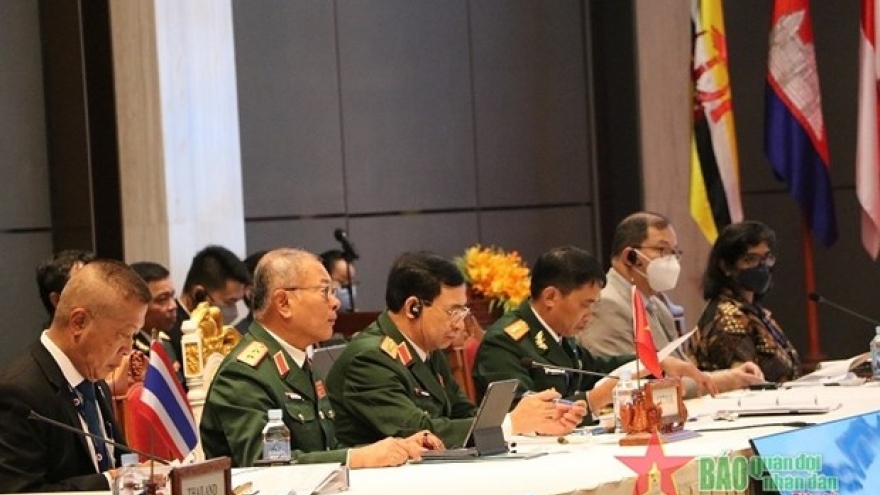Vietnam proposes directions at ADMM Retreat in Malaysia
A Vietnamese delegation led by permanent member of the Central Military Commission, Chief of the General Staff of the Vietnam People’s Army and Deputy Minister of National Defence Gen. Nguyen Tan Cuong attended the ASEAN Defence Ministers’ Meeting (ADMM) Retreat in Penang, Malaysia on February 26.

In his speech, Cuong praised Malaysia's chosen theme “ASEAN Unity for Security and Prosperity”, saying that amid the increasingly complex non-traditional security challenges, which impact each nation as well as global and regional peace, stability and development, ASEAN has remained united, fostered cooperation, and achieved significant results in maintaining regional peace, stability and security.
The ADMM and ADMM+, along with other ASEAN-led defence cooperation mechanisms, continue to affirm their role as key platforms for defence policy consultation and practical defence cooperation, improving the region’s ability to respond to security challenges, he said.
Cuong proposed key directions for ADMM and ADMM+ to further strengthen unity and cohesion within diversity while upholding ASEAN’s norms of conduct and principled stance on global and regional issues.
The first suggestion involved the settlement of disputes through peaceful means, grounded in respect for independence, sovereignty, and legitimate interests of all nations, and refraining from the use of force or threat to use force in international relations. ASEAN should remain committed to international law, including the 1982 United Nations Convention on the Law of the Sea (UNCLOS), seriously follow global and regional commitments such as the Declaration on the Conduct of Parties in the East Sea (DOC), and support the establishment of a clear, practical and effective Code of Conduct in the East Sea (COC).
He proposed the continued consolidation of solidarity, sincerity, and trust, while upholding the principle of consensus based on respect for differences among ADMM and ADMM+ member states. This, he noted, would ensure that ADMM and ADMM+ remain a bridge for dialogue and a platform for cooperation among all parties.
The Vietnamese official underscored the importance of enhancing ASEAN’s defence resilience, leveraging both internal and external resources, with internal resources being fundamental, strategic, long-term and decisive, while external resources remain important and necessary.
Countries should effectively coordinate initiatives and cooperative activities within ADMM and ADMM+, as well as other regional mechanisms. This is particularly crucial in addressing cross-sectoral issues and ensuring a timely response to emerging security challenges. He added that it is essential to ensure that activities are well-integrated and mutually reinforcing, making the most efficient use of resources to enhance self-reliance and resilience. This, in turn, will contribute to peace, security, and prosperity in the region and beyond.
Referring to the six proposals put forward by the Malaysian Ministry of Defence for 2025, Cuong spoke highly of Malaysia’s initiative on AI cooperation in defence, saying that such reflects ADMM’s proactive approach and timely response amid growing global and regional interest in AI governance.
On the sidelines of the event, Cuong and the Vietnamese delegation held four bilateral meetings with their counterparts from Laos, Cambodia, Indonesia, and Malaysia.
During his meeting with Malaysian Defence Minister Dato’ Seri Mohamed Khaled bin Nordin, Cuong expressed his delight at the positive development of bilateral relationship, especially following its upgrade to a Comprehensive Strategic Partnership during Party General Secretary To Lam’s state visit to Malaysia in November 2024.
Both sides highlighted notable achievements, including the exchange of high-ranking delegations, the effective maintenance of dialogue mechanisms, personnel training collaboration, maritime search and rescue operations, regular goodwill naval visits, and mutual consultation and support at multilateral forums.
Cuong reaffirmed Vietnam’s support for Malaysia’s role as co-chair of the ADMM+ Experts’ Working Group on Counter-Terrorism with India for the 2024-2027 cycle.
The two sides also expected to further advance cooperation, launch new collaborative initiatives, and tighten Vietnam-Malaysia ties.
The Malaysian Defence Minister, in his opening speech, outlined ADMM’s priorities for this year, including AI and cybersecurity in defence; maritime security; humanitarian assistance and disaster relief, covering search and rescue; defence industry cooperation; and security threats from non-state actors and biological risk management.
The two-day ADMM Retreat concluded on February 26, bringing together more than 150 delegates.
Malaysia, which previously took on the ASEAN Chairmanship in 1977, 1997, 2005, and 2015, officially assumed the role again in January 2025, under the theme “Inclusive and Sustainable”. Over 300 meetings and events are planned throughout the year.


